What is Erectile Dysfunction?
Erectile Dysfunction (ED) is a condition in which a man is unable to achieve or maintain erection sufficient for satisfactory sexual performance. Penis contains two chambers, corpora cavernosa, which fill with blood to produce an erection. Erectile dysfunction can occur when there is an issue with blood flow to the penis, nerve function or both. It is a common sexual problem affecting millions of men worldwide. Erectile dysfunction, which is a very common problem that many men do not like to talk about, is a problem that needs to be solved not only for men but also for their partners and because of its effects on social life.


What is Erectile Dysfunction’s (ed) Symptoms ?
Beside the main symptom of difficulty achieving or maintaining erection, there are other signs and symptoms that may be associated with erectile dysfunction (ED). Here are some signs and symptoms:
- Reduced Sexual Desire: Decreased interest in sex or decreased sexual drive may be a sign of ED.
- Trouble Getting Erection: Inability to achieve erection or persistent soft or short-lived erection, is a common symptom of ED.
- Trouble Keeping Erection: If a man can achieve erection but is unable to keep it long enough for sexual activity, this may indicate ED.
- Ejaculation Problems: If a man experiences a decreased force or volume of ejaculation, this may also be a sign of ED.
- Anxiety or Depression: ED can cause feelings of shame, guilt or low self-esteem, which can lead to anxiety and depression.
What is Causes Erectile Dysfunction’s (ed)?
Erectile dysfunction (ED) can have multiple causes, which can be broadly categorized into physical and psychological factors.
- Physical causes:
- Cardiovascular Disease: Cardiovascular disease, such as heart disease and stroke, can affect blood flow to the penis and cause ED.
- Diabetes: Diabetes can damage the blood vessels and nerves that control erections, leading to ED.
- Obesity: Obesity can cause hormonal imbalances and increase the risk of cardiovascular disease both of which can contribute to ED.
- High Blood Pressure: High blood pressure can damage blood vessels and reduce blood flow to the penis, leading to ED.
- High Cholesterol: High cholesterol can contribute to the development of fatty deposits in blood vessels which can reduce blood flow to the penis and cause ED.
- Hormonal Imbalances: Low levels of testosterone, the male sex hormone, can cause ED. You can find healthy hormone level in below page:
- Neurological Conditions: Some neurological conditions, such as multiple sclerosis, Parkinson’s disease and spinal cord injuries, can affect nerve function and cause ED.
- Penis Injuries or Abnormalities: Penis injuries, such as Peyronie’s disease or abnormalities, such as curvature of the penis, can cause ED.
- Substance Abuse: Substance abuse, including alcohol and drug use, can interfere with normal sexual function and cause ED.
- Psychological Causes:
- Stress: Stress can lead to physical and psychological changes that can affect sexual function and cause ED.
- Anxiety: Anxiety and performance anxiety can lead to ED by interfering with the ability to relax and focus during sexual activity.
- Depression: Depression can cause decreased sexual desire and interfere with normal sexual function, leading to ED.
- Relationship Problems: Relationship problems, such as communication issues, can contribute to ED by causing stress and anxiety.
- Performance Anxiety: Performance anxiety or the fear of not being able to perform sexually, can lead to ED by causing stress and anxiety.
- Negative Self-Image: Negative self-image and feelings of shame or guilt about sex can cause ED by causing stress and anxiety.
What is Erectile Dysfunction (ED) Treatment Methods?
Erectile dysfunction (ED) can be treated through a variety of methods such as lifestyle changes, medications, psychological therapy, mechanical devices and surgery.
- Lifestyle Changes:
- Quitting Smoking: Smoking can damage blood vessels and reduce blood flow to the penis, contributing to ED. Quitting smoking can help improve sexual function.
- Limiting Alcohol Consumption: Excessive alcohol consumption can harms for normal sexual function and lead to ED. Limiting alcohol consumption can help improve sexual function.
- Exercising Regularly: Exercise can help improve circulation and cardiovascular health which can help reduce the risk of ED.
- Eating Healthy Diet: A healthy diet that is rich in fruits, vegetables, whole grains and lean protein can help improve overall health and reduce the risk of ED.
- Medications:
- Phosphodiesterase Type 5 (PDE5) Inhibitors: PDE5 inhibitors, such as sildenafil (Viagra), tadalafil (Cialis) and vardenafil (Levitra) work by increasing blood flow to the penis. They should be taken approximately 30 minutes to an hour before sexual activity.
- Alprostadil: Alprostadil is a drug that can be injected into the penis or used as a suppository to increase blood flow to the penis and lead to an erection.
- Testosterone Replacement Therapy (TRT): TRT is used to treat men with low testosterone levels which can cause ED. TRT can be administered as a gel, patch or injection.
- Psychological Therapy:
- Cognitive Behavioral Therapy (CBT): CBT is a form of therapy that can help address anxiety and depression, which can lead to ED. CBT can help individuals identify and change negative thought patterns and behaviors that may be contributing to ED.
- Couples Therapy: Couples therapy can help address relationship problems that may be contributing to ED. Therapist can help couples communicate more effectively and work through relationship issues that may be affecting sexual function.
- Mechanical Devices:
- Vacuum Erection Devices: Vacuum erection devices use suction to create an erection. These device consists of a cylindrical tube that is placed over the penis and a pump that is used to create suction.
- Penile Implants: Penile implants are surgically placed devices that allow for an erection. There are two main types of penile implants: inflatable and malleable.
- Surgery:
- Venous Ligation Surgery: Venous ligation surgery is a procedure that seals off veins to improve blood flow to the penis. This surgery can be effective for men with venous leak syndrome, a condition in which blood flows out of penis too quickly.
- Penile Arterial Revascularization: Penile arterial revascularization is a surgical procedure that reroutes blood flow to the penis. This procedure can be effective for men with arterial insufficiency, a condition in which blood flow to the penis is reduced.
Most effective treatment will depend on the underlying cause of the ED and that a combination of treatments may be necessary.



Which Exercise Help For Erectile Dysfunction?
Physical exercise can help alleviate the symptoms of ED by improving overall health and blood flow. Here are a few exercises that may help:
- Aerobic Exercises: Aerobic exercises, such as running, cycling and swimming, can help improve blood flow and cardiovascular health, which can have a positive impact on ED. Regular aerobic exercise can also help maintain a healthy weight, which is important for overall sexual health.
- Pelvic Floor Exercises: Pelvic floor exercises, mostly known as Kegels, can help strengthen the muscles that support the penis and control ejaculation. Doing Kegels regularly can improve pelvic floor muscle tone and help treat ED caused by nerve or muscle damage.
- Resistance Training: Resistance training, such as weightlifting, can help improve blood flow, increase testosterone levels and improve overall health.
What is Best Foods For Erectile Dysfunction?
There is no single “best” food for erectile dysfunction (ED) but incorporating some nutrients and lifestyle changes into your diet may help improve ED symptoms. Here is some effective food advices for overcome ED:
- Fruits and vegetables: Fruits and vegetables are a rich source of antioxidants, which protect against oxidative stress and inflammation that can contribute to ED. Antioxidant-rich foods include dark, leafy greens, berries and tomatoes.
- Whole grains: Whole grains are a good source of fiber and essential nutrients, such as B vitamins, iron and zinc that are important for healthy blood flow and sexual function. Some examples of whole grains include whole wheat, brown rice and oats.
- Lean protein: Lean protein sources, such as chicken, fish and turkey, are essential for overall health, including sexual health. These protein sources help build and repair tissues in the body, including those in the penis.
- Nuts and seeds: Nuts and seeds are high in magnesium, which is a mineral that has been shown to improve ED. Nuts and seeds also provide healthy fats, fiber and other essential nutrients that can benefit overall health.
- Coffee: Moderate coffee consumption has been linked to improved blood flow and sexual function, likely due to its caffeine content. But excessive caffeine intake can have negative effects on ED, so it’s best to limit coffee consumption to 2-3 cups per day.
- Olive oil: Olive oil is rich in monounsaturated fats, which have been shown to have a positive impact on ED. These healthy fats can help improve blood flow and reduce inflammation in the body.
- Watermelon: Watermelon is high in citrulline, an amino acid that can improve blood flow and may help improve ED symptoms. Some studies have also suggested that watermelon may help improve other aspects of sexual health, such as libido.
Maintaining a healthy lifestyle in general, including regular exercise, stress management and avoiding tobacco and excessive alcohol consumption, as these factors can all contribute to ED.
How You Can Test for Erectile Dysfunction at Home?
There are a few ways to test for erectile dysfunction (ED) at home. Here are:
- Penile self-injection test: In this test, a man self-injects a medication into the base of his penis, which can produce an erection within 5-20 minutes. If an erection is produced, it suggests that there is adequate blood flow to the penis and the problem may be related to psychological or hormonal factors.
- Penile vacuum test: A man can use a vacuum erection device, which draws blood into the penis to produce an erection. This test can help determine if there is an issue with blood flow to the penis.
- Erection hardness score: In this test, a man rates the hardness of his erections on a scale of 0-4 with 4 being the hardest. A score of 2 or less suggests that ED may be present.



FAQs About Erectile Dysfunction?
Here are 10 frequently asked questions and answers about erectile dysfunction:
- What is erectile dysfunction (ED)?
- ED is a common sexual health issue characterized by the inability to achieve or maintain an erection sufficient for sexual intercourse.
- What causes ED?
- ED can have multiple causes, including physical factors such as cardiovascular disease, nerve damage and hormonal imbalances, as well as psychological factors such as stress, anxiety, and depression.
- How common is ED?
- ED is a common issue, affecting an estimated 18 million men in the United States.
- Is ED a normal part of aging?
- While ED is more common in older men, it is not a normal part of aging and can be treated at any age.
- Can lifestyle factors contribute to ED?
- Yes, lifestyle factors such as poor diet, lack of exercise, smoking and excessive alcohol consumption can contribute to ED.
- Is ED treatable?
- Yes, ED is treatable and many effective treatment options are available, including oral medications, penile injections and penile implants.
- Can ED be reversed without medication?
- In some cases, ED may be reversed without medication by making lifestyle changes such as exercising regularly, quitting smoking and managing stress.
- Are there any over-the-counter remedies for ED?
- There are no over-the-counter remedies that have been proven to effectively treat ED.
- What are the side effects of ED medications?
- Side effects of ED medications change but common side effects include headache, flushing, indigestion and nasal congestion.
- Is it safe to use ED medications if I have a heart condition?
- It is not safe to use ED medications if you have certain heart conditions or take certain medications. Always consult with a healthcare provider before starting any new treatment for ED.
You should talk with your partner clearly and work together on this problem. If you work together solving and overcome this problem more easily. Especially partners support very important. If you feel yourself under pressure, you may ask your partner for time to recovery process.

